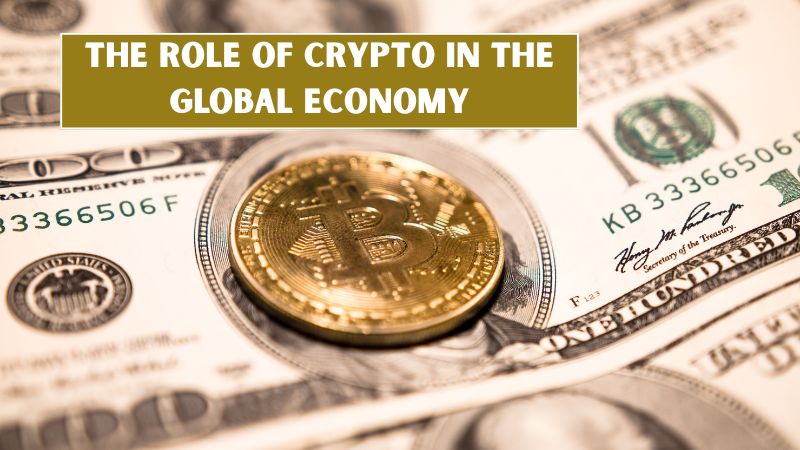Cryptocurrency is more than just a digital trend—it’s transforming how the world thinks about money. What started with Bitcoin over a decade ago has now become a financial revolution influencing global markets, businesses, and governments. As crypto grows in popularity, its role in the global economy continues to expand, shaking up traditional systems and opening new doors for innovation and inclusion.
Unlike physical currencies, cryptocurrencies are decentralized, meaning they’re not controlled by any government or central bank. This makes them unique, powerful, and at times, controversial. But one thing is clear: crypto is here to stay, and its impact on the global economy is only getting stronger.
Digital Payments Without Borders
One of the most powerful aspects of cryptocurrency is the ability to make borderless payments. Traditional banking systems often involve delays, currency conversions, and high fees for international transactions. Crypto changes that. It allows people to send money across the world almost instantly and at a lower cost.
This is especially helpful in developing countries where access to banking is limited. With just a smartphone and internet connection, people can send and receive digital payments without needing a traditional bank account. This unlocks opportunities for millions and helps connect global markets more efficiently.
New Avenues for Investment
Cryptocurrencies have opened new doors for investment. People are no longer limited to stocks, bonds, or real estate. Now, they can invest in digital assets like Bitcoin, Ethereum, and other tokens. Some investors see crypto as a store of value, like digital gold, while others use it for short-term trading.
This shift has attracted both individual and institutional investors. As more money flows into crypto markets, it boosts economic activity and drives innovation in financial technologies. Although prices can be volatile, the potential for high returns continues to attract attention around the world.
Boosting Financial Inclusion
Crypto has the power to bridge the financial gap. Billions of people around the world still lack access to traditional banking services. Cryptocurrencies give them a way to participate in the global economy without needing a credit score, bank account, or even a physical address.
With digital wallets and mobile apps, people can save, invest, and spend crypto in their everyday lives. This type of financial inclusion empowers individuals, supports small businesses, and strengthens local economies, especially in underserved regions.
Supporting Small Businesses and Entrepreneurs
For small businesses, cryptocurrency offers faster payments and access to a global customer base. Instead of dealing with international bank transfers or credit card fees, merchants can accept crypto and receive payments almost instantly.
Crypto also makes it easier for startups and entrepreneurs to raise funds. Through Initial Coin Offerings (ICOs) or token sales, companies can gather investment from a wide pool of supporters around the globe. This encourages innovation and allows new ideas to flourish without relying on traditional venture capital routes.
Changing the Banking and Finance Industry
Banks and financial institutions are beginning to take crypto seriously. Some have started offering crypto-related services, while others are exploring blockchain technology to improve their operations. This signals a shift in the way money is handled and stored.
Crypto challenges the traditional role of banks by offering decentralized finance (DeFi) solutions. With DeFi, people can borrow, lend, and earn interest without needing a bank. This change pushes the financial industry to evolve and adapt to a more open and user-controlled future.
Stimulating Global Job Markets
The rise of crypto has also created a growing job market. New roles are being developed in blockchain development, cybersecurity, crypto analysis, marketing, legal support, and more. This growing industry is providing career opportunities for people all over the world.
From freelancers working on NFT platforms to developers building new blockchain networks, the crypto industry is rapidly expanding. Countries that embrace this change can benefit from job creation, tech growth, and a competitive edge in the global economy.
Reducing Costs and Increasing Efficiency
Blockchain, the technology behind cryptocurrencies, can make global systems more efficient. It reduces the need for middlemen, automates processes, and ensures secure transactions through smart contracts.
For example, international trade, shipping, and supply chain tracking can be streamlined with blockchain technology. This saves time, reduces fraud, and cuts costs—helping businesses grow and making products more affordable for consumers.
Governments and Regulations
As crypto becomes more common, governments are working to understand and regulate it. Some countries are embracing it fully, while others are still cautious. Regulation can bring more trust and stability to the market, making it safer for everyday users.
Some governments are even creating their own digital currencies known as Central Bank Digital Currencies (CBDCs). These digital versions of national currencies aim to combine the benefits of crypto with the stability of central control. The move shows how seriously the global economy is taking the rise of crypto.
Risks and Challenges Ahead
While crypto offers many benefits, it also comes with risks. Price volatility, scams, and lack of regulation can make it a risky space for new users. Cybersecurity is another concern, as wallets and exchanges can be vulnerable to hacking.
Environmental impact is also a hot topic. Some cryptocurrencies, like Bitcoin, require a lot of energy to operate. However, new eco-friendly methods and coins are emerging to address this issue. As the industry matures, many of these challenges are being tackled with innovation and responsible practices.
The Future of Crypto in the Global Economy
Looking ahead, the role of crypto in the global economy will only grow. As adoption increases and technology evolves, cryptocurrencies will likely become more integrated into daily life. From shopping and investing to government services and digital IDs, crypto could play a central role in how we interact with money.
Businesses, governments, and individuals all have a part to play in shaping this future. By staying informed and open to change, the world can harness the power of crypto for economic growth, fairness, and innovation.
Conclusion
Cryptocurrency is no longer just a trend—it’s a key player in the global economy. It’s changing how we pay, invest, save, and even how governments think about money. From supporting financial inclusion to creating jobs and boosting international trade, crypto is unlocking new possibilities.
Although challenges remain, the momentum behind crypto continues to grow. As more people around the world begin to use and understand digital currencies, the global economy will become more connected, more efficient, and more inclusive. The journey is just beginning, but the impact is already being felt far and wide.


